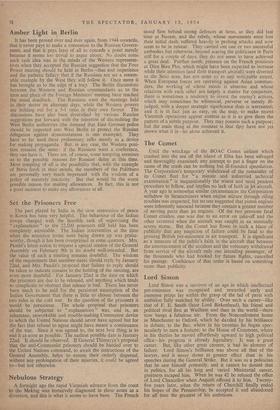Set the Prisoners Free
The part played by India in the slow restoration of peace in Korea has been very helpful. The behaviour of the Indian troops charged with the horrible task of supervising the " explanations " to the 22,500 prisoners still held has been completely admirable. The Indian intervention at the time when the armistice terms were being drawn up was praise- worthy, though it has been overpraised in some quarters. Mrs. Pandit's latest action to request a special session of the General Assembly on February 9th is no doubt well-intended. But the value of such a meeting remains doubtful. The wisdom of the requirement that member-states should reply by January 22nd, and Mrs. Pandit's proposal that failure to reply should be taken to indicate consent to the holding of the meeting, are even more doubtful. For January 22nd is the date on which the prisoners are due to be released, and anything which tends to complicate or obstruct that release is bad. There has never been much to be said for the persistent assumption of the Indian Government that there is little to choose between the two sides in the cold war. In the question of the prisoners it would be pernicious. The whole proposal that prisoners should be subjected to " explanations " was, and is, an inhumane, unworkable and trouble-making Communist device to which the United Nations should never have agreed but for the fact that refusal to /agree might have meant a continuance of the war. Since it was agreed to, the next best thing is to end it as soon as possible. The earliest possible date is January 22nd. It should be observed. If General Thimayya's proposal that the anti-Communist prisoners should be handed over to the United Nations command, to await the instructions of the General Assembly, helps to ensure their orderly dispersal, without any prolongation of their miseries, it could be agreed to—but not otherwise.


































 Previous page
Previous page